Related Research Articles
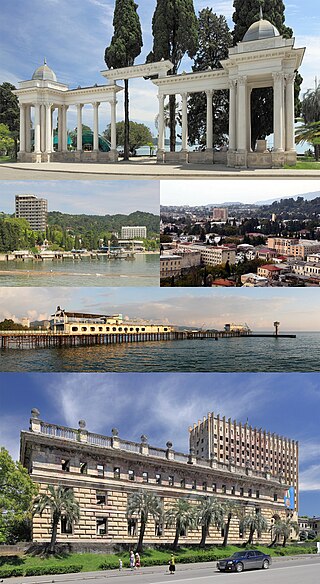
Sukhumi is a city in a wide bay on the Black Sea's eastern coast. It is both the capital and largest city of the Republic of Abkhazia, a partially recognised state that most countries consider a part of Georgia. The city has been controlled by Abkhazia since the Abkhazian war in 1992–93. The city, which has an airport, is a port, major rail junction and a holiday resort because of its beaches, sanatoriums, mineral-water spas and semitropical climate. It is also a member of the International Black Sea Club.

The ethnic cleansing of Georgians in Abkhazia, also known in Georgia as the genocide of Georgians in Abkhazia, refers to the ethnic cleansing, massacres, and forced mass expulsion of thousands of ethnic Georgians living in Abkhazia during the Georgian-Abkhaz conflict of 1992–1993 and 1998 at the hands of Abkhaz separatists and their allies. Armenians, Greeks, Russians, and opposing Abkhazians were also killed.
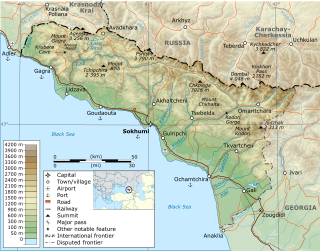
The War in Abkhazia was fought between Georgian government forces for the most part and Abkhaz separatist forces, Russian government armed forces and North Caucasian militants between 1992 and 1993. Ethnic Georgians who lived in Abkhazia fought largely on the side of Georgian government forces. Ethnic Armenians and Russians within Abkhazia's population largely supported the Abkhazians and many fought on their side. The separatists received support from thousands of North Caucasus and Cossack militants and from the Russian Federation forces stationed in and near Abkhazia.
Football is a major sport in Abkhazia. During Soviet times, the main club within Abkhazia itself was FC Dinamo Sukhumi, but Abkhazian footballers were prominent in the Georgian team FC Dinamo Tbilisi and in other Soviet teams. In 1994, after its declaration of independence from Georgia, Abkhazia organised a nine-team amateur league.

The Abkhazian Armed Forces are the military forces of Abkhazia. The forces were officially created on 12 October 1992, after the outbreak of the 1992–1993 war with Georgia. The basis of the armed forces was formed by the ethnic Abkhaz National Guard. The Abkhaz military is primarily a ground force but includes small sea and air units. According to the authorities of the Republic of Abkhazia, the Abkhazian Land Forces are organised along the Swiss model – in time of peace they have personnel of 3,000 to 5,000 and in case of war further 40–50,000 reservists are called out. Georgia regards the Abkhaz armed forces as "unlawful military formations" and accuses Russia of supplying and training the Abkhaz troops.

Ochamchira District is a district of the partially recognised Abkhazia. Its capital is Ochamchire, the town by the same name. The district is smaller than the Ochamchire district in the de jure subdivision of Georgia, as some of its former territory is now part of Tkvarcheli District, formed by de facto Abkhaz authorities in 1995. The population of the Ochamchira district is 24,629 according to the 2003 census. Until the August 2008 Battle of the Kodori Valley, some mountainous parts of the district were still under Georgian control, as part of Upper Abkhazia.

During the Soviet-era, the Abkhaz ASSR was divided into six raions (districts) named after their respective capitals.
Many inhabitants of Abkhazia are Orthodox Christians, With significant minorities adhering to Islam and the Abkhaz neopaganism, or the "Abkhazian traditional religion". The influence of this last has always remained strong and has been experiencing a revival through the 1990s and 2000s.

Abkhazian railway is a rail operator in the partially recognised state of Abkhazia. Under a monopoly agreement, it is fully managed and partially owned by Russian Railways for a ten year contract from 2009-2019.
Astamur Anton-ipa Adleiba is a former Minister of Youth, Sports, Tourism and Resorts of Abkhazia and a former mayor of Abkhazia's capital Sukhumi. He was dismissed from this last position for corruption.

Abkhazia, officially the Republic of Abkhazia, is a partially recognised state in the South Caucasus, on the eastern coast of the Black Sea, at the intersection of Eastern Europe and Western Asia. It covers 8,665 square kilometres (3,346 sq mi) and has a population of around 245,000. Its capital and largest city is Sukhumi.
The Armenians in Abkhazia form the second largest ethnic group in Abkhazia after the native Abkhazians. Armenians settled in Abkhazia in late 19th and the early 20th centuries and are now the largest ethnic group in Sukhumi, Gulripsh and Gagra Districts forming 20% of the Abkhazian population with approximately 42,000 out of a total of 242,862.
The office of Minister for Defence has been one of the most important in the breakaway Republic of Abkhazia due to the ongoing conflict with Georgia. The person in the position heads the Ministry of Defence of Abkhazia, which controls the Abkhazian Armed Forces.
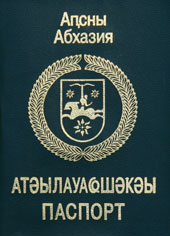
The Abkhazian passport is issued to citizens of the Republic of Abkhazia for the purpose of international travel and for the purpose of legal identification within Abkhazia. As Abkhazia is only recognised by Russia, Venezuela, Syria, Nicaragua and Nauru, for all other destinations Abkhazian citizens must use another passport for international travel.
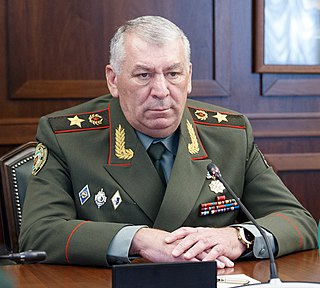
Mirab Boris-ipa Kishmaria was an Abkhaz politician and army general who served as the Minister of Defence of the disputed Republic of Abkhazia from 2015 until 2020.
The War in Abkhazia from 1992 to 1993 was waged chiefly between Georgian government forces on one side, Russian military forces on other side supporting separatist forces demanding independence of Abkhazia from Georgia. http://www.historyorb.com/russia/georgia.php Ethnic Georgians, who lived in Abkhazia fought largely on the side of Georgian government forces. Ethnic Armenians and Russians within Abkhazia's population, largely supported Abkhazians and many fought on their side. The separatists were supported by thousands of the North Caucasus and Cossack militants and by the Russian Federation forces stationed in and near Abkhazia.
The Government of President Sergei Bagapsh was the Government of the Republic of Abkhazia from 2005 until 2011.
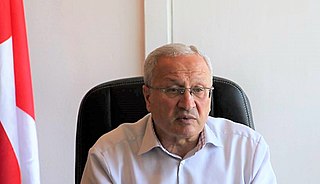
Elguja "Gia" Gvazava is a Georgian politician. Being a native of Georgia's autonomous republic of Abkhazia and a member of the local legislature since 1991, Gvazava was forced, along with most of the region's Georgian population, to flee the secessionist victory in Abkhazia in 1993. From March 20, 2009, to April 8, 2019, he served a chairman of the Supreme Council of Abkhazia, based in exile in the Georgian capital of Tbilisi.
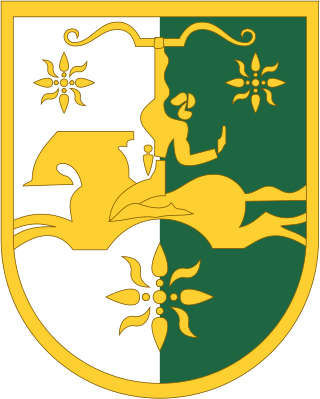
Presidential elections were held in the Republic of Abkhazia on 24 August 2014. The sixth such elections since the post of President of Abkhazia was created in 1994, they were held early due to the resignation of President Alexander Ankvab on 1 June 2014 following the 2014 Abkhazian political crisis. Four candidates contested the elections, which were won by Raul Khadjimba, who received just over 50% of the vote.
References
- 1 2 "Two Blasts Reported on Abkhaz Railway". Civil Georgia. 2008-06-19. Retrieved 2008-07-04.[ dead link ]
- ↑ "Six Injured in Abkhaz Blasts". Civil Georgia. 2008-06-29. Retrieved 2008-07-04.
- ↑ "Администрация Гагрского района выделит материальную помощь пострадавшим во время взрыва 29 июня". Администрация Президента Республики Абхазия. 2008-07-02. Archived from the original on 2011-07-21. Retrieved 2008-07-04.
- ↑ "Reports: Sokhumi Blast Injures Six". Civil Georgia. 2008-06-30. Retrieved 2008-07-04.
- ↑ "Состояние раненых в результате взрыва 30 июня в районе Сухумского рынка - удовлетворительное". Администрация Президента Республики Абхазия. 2008-07-02. Archived from the original on 2011-07-21. Retrieved 2008-07-04.
- 1 2 "Blast Close to Russian Peacekeeper Post". Civil Georgia. 2008-07-02. Retrieved 2008-07-04.
- 1 2 3 "Four Die in Gali Blast". Civil Georgia. 2008-07-07. Archived from the original on 12 August 2008. Retrieved 2008-07-08.
- ↑ "4 человека погибли в результате взрыва в центре города Гал". Администрация Президента Республики Абхазия. 2008-07-07. Archived from the original on 2011-07-21. Retrieved 2008-07-08.
- ↑ "Вице-президент Рауль Хаджимба призвал население Абхазии быть бдительными". Администрация Президента Республики Абхазия. 2008-07-07. Archived from the original on 2011-07-21. Retrieved 2008-07-08.
- ↑ "Sokhumi Closes Border". Civil Georgia. 2008-07-01. Retrieved 2008-07-04.
- ↑ "Ситуация в приграничном Гальском районе - стабильная". Администрация Президента Республики Абхазия. 2008-07-02. Archived from the original on 2011-07-21. Retrieved 2008-07-04.
- 1 2 3 4 "Abkhazia Blasts Scare Tourists". Institute for War & Peace Reporting. 2008-07-03. Archived from the original on 8 July 2008. Retrieved 2008-07-04.
- 1 2 "Four Blasts in Two Days Slightly Injure 12 in Abkhazia". Civil Georgia. 2008-06-30. Retrieved 2008-07-04.
- 1 2 "Tbilisi Calls for Joint Police Force in Gali, Ochamchire". Civil Georgia. 2008-07-07. Retrieved 2008-07-08.
- ↑ "U.S. Calls for International Police Force in Abkhazia". Civil Georgia. 2008-07-08. Retrieved 2008-07-08.
- ↑ "Sokhumi Rules Out International Police Force". Civil Georgia. 2008-07-08. Retrieved 2008-07-08.